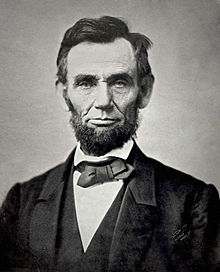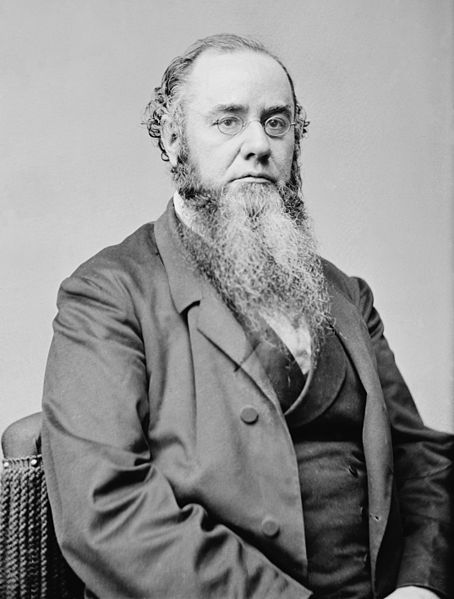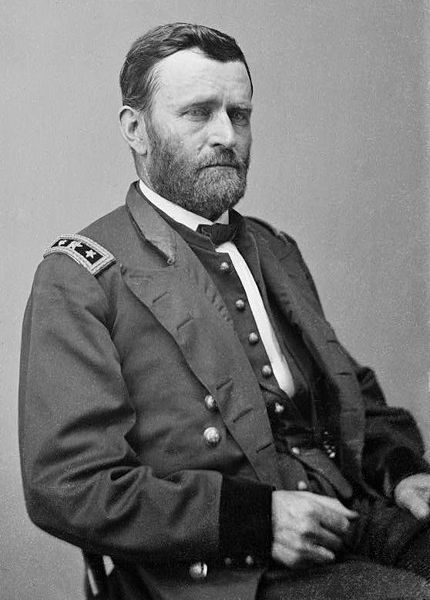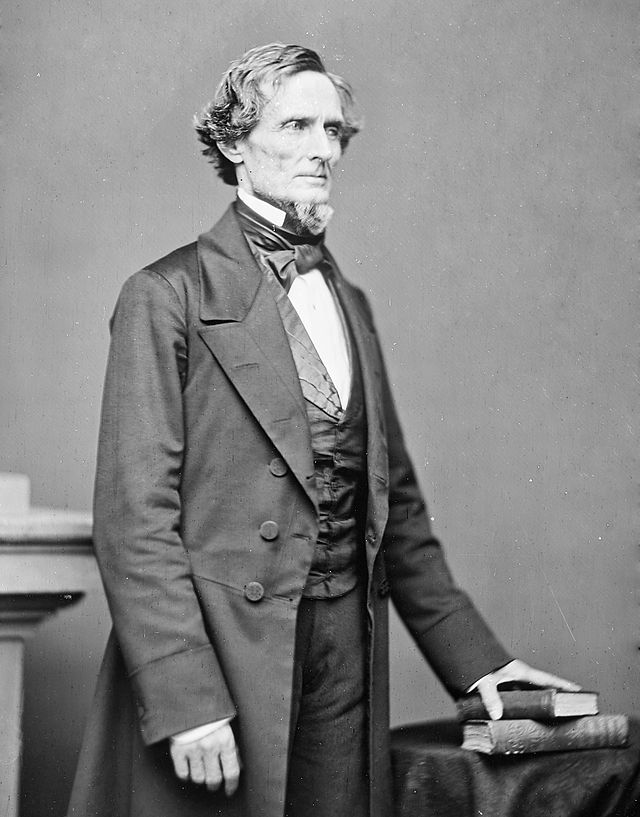A “Visionary” Plan? The Proposed March 1865 Peace Conference, Part 6

(Part 1, Part 2, Part 3, Part 4, and Part 5 are available. Part 6 is the concluding post in the series.)
From his headquarters at City Point, Grant, in turn, informed Lincoln and Stanton that Ord had met with Longstreet to discuss prisoner exchanges. He made sure they knew that Ord “had my authority to do so.” He also mentioned that “a general conversation ensued on the subject of the War” that led to the letters from General Lee, which were included with the telegram, and therefore, he added, “I respectfully request instructions.”[1]
When Lincoln read the telegram, his initial reaction was hopeful. “At first Lincoln warmed to the idea of a conference,” according to Brooks Simpson, “expressing his desire to extend ‘the most lenient and generous terms to a defeated foe.’” But then Stanton interjected, and “sternly reminded the president that it was Lincoln’s responsibility, not Grant’s to set forth peace terms,” as Simpson points out. After careful consideration, Lincoln agreed. Stanton then informed the Union general of the president’s position:

The President directs me to say to you that he wishes you to have no conference with General Lee unless it be for the capitulation of Gen. Lee’s army, or on some minor, and purely, military matter. He instructs me to say that you are not to decide, discuss, or confer upon any political question. Such questions the President holds in his own hands; and will submit them to no military conferences or conventions. Meantime you are to press to the utmost, your military advantages.[2]
Grant was surprised and angered by the sharp response he received from Stanton, including an additional telegram condemning “Ord’s conduct in holding intercourse with General Longstreet upon political questions not committed to his charge.” He admonished Grant to “instruct officers appointed to meet rebel officers to confine themselves to the matters specially committed to them.” To Stanton, General Ord had clearly overstepped his bounds. But Ord had high hopes for the success of his “visionary” proposition, which is why he took a great risk in pursuing it. Now he accepted that he would suffer the consequences. His brother even acknowledged, shortly after the failed attempt, that Ord did not believe he would “be long in this Department or in command of it.” But surprisingly, he managed to keep his position, particularly because, as Cresap argues, “he could fight,” not to mention that he also maintained Grant’s support, which was vital.[3]
But Grant was stung by Stanton’s message. Colonel Porter remarked how Grant “thought that the President was unduly anxious about the manner in which the affair would be treated.” Without wasting any time, Grant immediately reported to Stanton that he surely recognized the limits of his authority. “I can assure you,” Grant pledged, “that no act of the enemy will prevent me from pressing all advantages gained to the utmost of my ability. Neither will I under any circumstances exceed my authority or in any way embarrass the Govt. It was because I had no right to meet Gen. Lee on the subject proposed by him that I referred the matter for instructions.”[4]

Grant had no choice then but to clarify his position to Lee and terminate any plans for a military convention, thus confirming Lee’s suspicions about how the Lincoln administration would respond to their proposal. “In regard to any apprehended misunderstanding in reference to the exchange of political prisoners,” Grant explained, “I think there need be none. Gen Ord and Gen Longstreet have probably misunderstood what I said to the former on the subject. Or I may have failed to make myself understood possibly.” Grant acknowledged that he “told General Ord to speak to General Longstreet . . . on the subject of releasing political or citizen prisoners.” But a military convention was simply out of the question, as Stanton had already made Lincoln’s position quite clear. Therefore, echoing Stanton, Grant plainly informed Lee, “I have no authority to accede to your proposition for a conference on the subject proposed. Such authority is vested in the President of the United States alone.” He went on to explain that “Gen Ord, could only have meant that I would not refuse an interview on any subject on which I have a right to act, which, of course, would be such as are purely of a military character, and on the subject of exchanges which has been entrusted to me.”[5]
And with this letter, any chance to convene a military convention and a parallel women’s interview evaporated, and once again, the attempt to open the road to peace had come to naught. But whether or not the plan would have led to peace, as Ord had hoped, is open to question. The positions espoused by Lincoln and Davis were, no doubt, far apart. So even if the two sides had somehow been able to organize a military convention in March, Davis probably would have rejected the terms proposed by Grant on behalf of the Lincoln administration—namely, restoring the Union.
 The question of slavery was another contentious issue likely to divide the two leaders, especially as the Thirteenth Amendment to the U.S. Constitution abolishing the institution was winding its way through the ratification process in the states by March 1865. Lincoln had made his position on slavery clear in his Annual Message to Congress on December 6, 1864, declaring that “while I remain in my present position I shall not attempt to retract or modify the emancipation proclamation, nor shall I return to slavery any person who is free by the terms of that proclamation or by any of the Acts of Congress.” At the same time, Davis had begun quietly supporting “a secret diplomatic mission to offer gradual abolition of slavery,” according to James McPherson, “in return for British and French recognition of the Confederacy.” Desperation made even the cause of the war a negotiable issue.[6]
The question of slavery was another contentious issue likely to divide the two leaders, especially as the Thirteenth Amendment to the U.S. Constitution abolishing the institution was winding its way through the ratification process in the states by March 1865. Lincoln had made his position on slavery clear in his Annual Message to Congress on December 6, 1864, declaring that “while I remain in my present position I shall not attempt to retract or modify the emancipation proclamation, nor shall I return to slavery any person who is free by the terms of that proclamation or by any of the Acts of Congress.” At the same time, Davis had begun quietly supporting “a secret diplomatic mission to offer gradual abolition of slavery,” according to James McPherson, “in return for British and French recognition of the Confederacy.” Desperation made even the cause of the war a negotiable issue.[6]

Of course, there were also many southern politicians who disagreed with Davis’s prosecution of the war and were seeking opportunities to open peace negotiations. Whether or not they would have been able to pressure Davis to accept Lincoln’s terms, work around him, or overrule him entirely, is subject to debate. With the fall of Richmond and the subsequent surrender of the Confederate armies, however, Davis’s objections became a moot point.
For his part, Lincoln never would have consented to southern independence, especially since the chance for victory was within the Union army’s grasp, as the Confederates struggled to survive. But Lincoln did pause to consider a military convention when he initially received Grant’s telegram requesting instructions. If it had not been for Stanton’s vociferous opposition, the convention might have gone forward.

Although the proposed March 1865 peace conference never materialized, it was still an important step on the road to Appomattox, and a remarkable one for the inclusion of a separate women’s meeting. Historians have argued that southern women helped to undermine the Confederate war effort during the winter of 1865 by writing to their family members on the front lines with a sense of desperation, and encouraging them to come home. The rate at which Confederate soldiers deserted the army increased significantly as a result. So if southern women helped to destabilize the Confederate war effort with their letters, a women’s peace meeting would have further undermined the Confederacy by acknowledging its expected dissolution with women acting as potent cultural symbols of reconciliation. Nonetheless, even though the idea never moved beyond the planning stage, it is intriguing to think of what might have been. It was a notable attempt, however, not only because it would have highlighted women’s role in participating in the war effort, but also because it would have given them a public voice in shaping the course of peace and reunion.[7]
In the end, the fact that this March conference almost took place also provides an interesting counterfactual narrative. For it not only allows us to imagine a course of action that might have ended the war earlier and thus saved lives, but it also helps us to better understand this critical period that ultimately led to the fall of the Confederacy and the preservation of the Union—one and undivided.
[1] Ulysses S. Grant to Edwin M. Stanton, March 3, 1865, The Papers of Ulysses S. Grant, 14:90.
[2] Simpson, Let Us Have Peace, 76. See also Cresap, Appomattox Commander, 166-167; Edwin M. Stanton to Ulysses S. Grant, March 3, 1865, The Collected Works of Abraham Lincoln, VIII: 1864-1865 (New Brunswick, NJ, 1953), 330-331.
[3] Edwin M. Stanton to Ulysses S. Grant, March 3, 1865, The War of the Rebellion, Series I, 46(2), 802; Cresap, Appomattox Commander, 169.
[4] Porter, Campaigning with Grant, 390; Ulysses S. Grant to Edwin M. Stanton, March 4, 1865, The Papers of Ulysses S. Grant, 14:100.
[5] Ulysses S. Grant to Robert E. Lee, March 4, 1865, The Papers of Ulysses S. Grant, 14:98-99.
[6] Lincoln, “Annual Message to Congress,” December 6, 1864, The Collected Works of Abraham Lincoln, VIII:152; James M. McPherson, Embattled Rebel: Jefferson Davis as Commander in Chief (New York, 2014), 235.
[7] See, for example, Drew Gilpin Faust, Mothers of Invention: Women of the Slaveholding South in the American Civil War (Chapel Hill, 1996).
Interesting series of articles !
A well-researched article that brought me much closer to the machinations that occurred at the end of the war. Congrats to the author for the great effort that went into the article and the care he took in writing it.